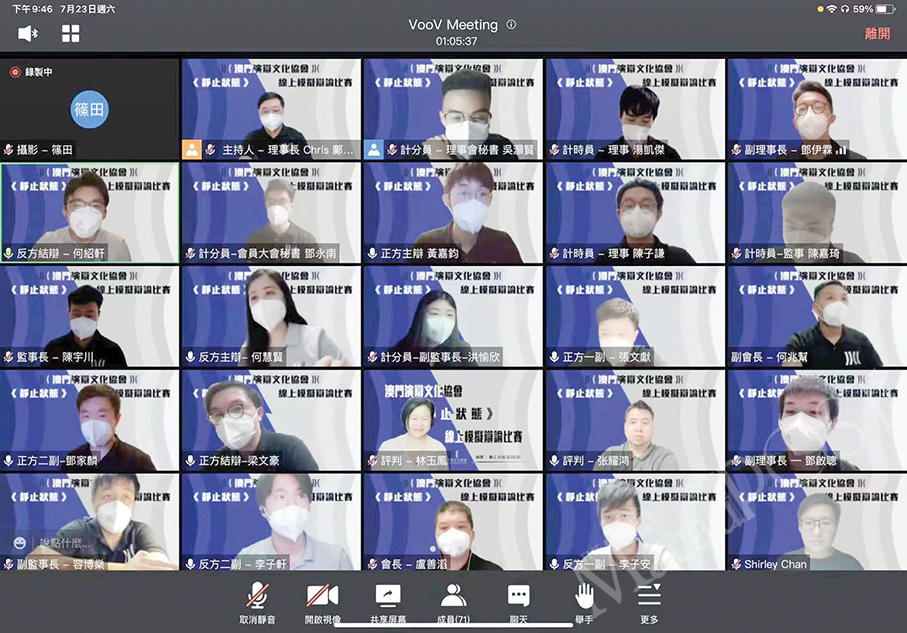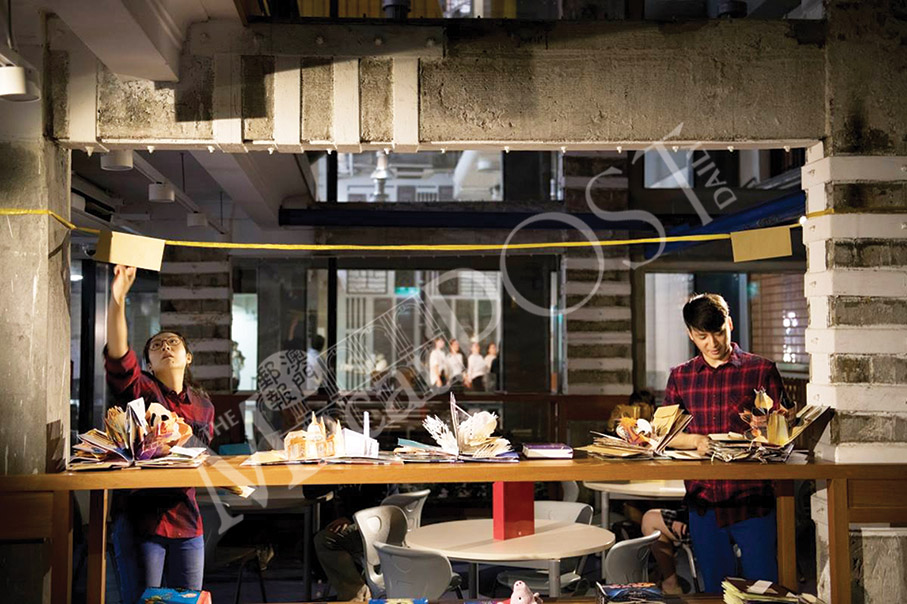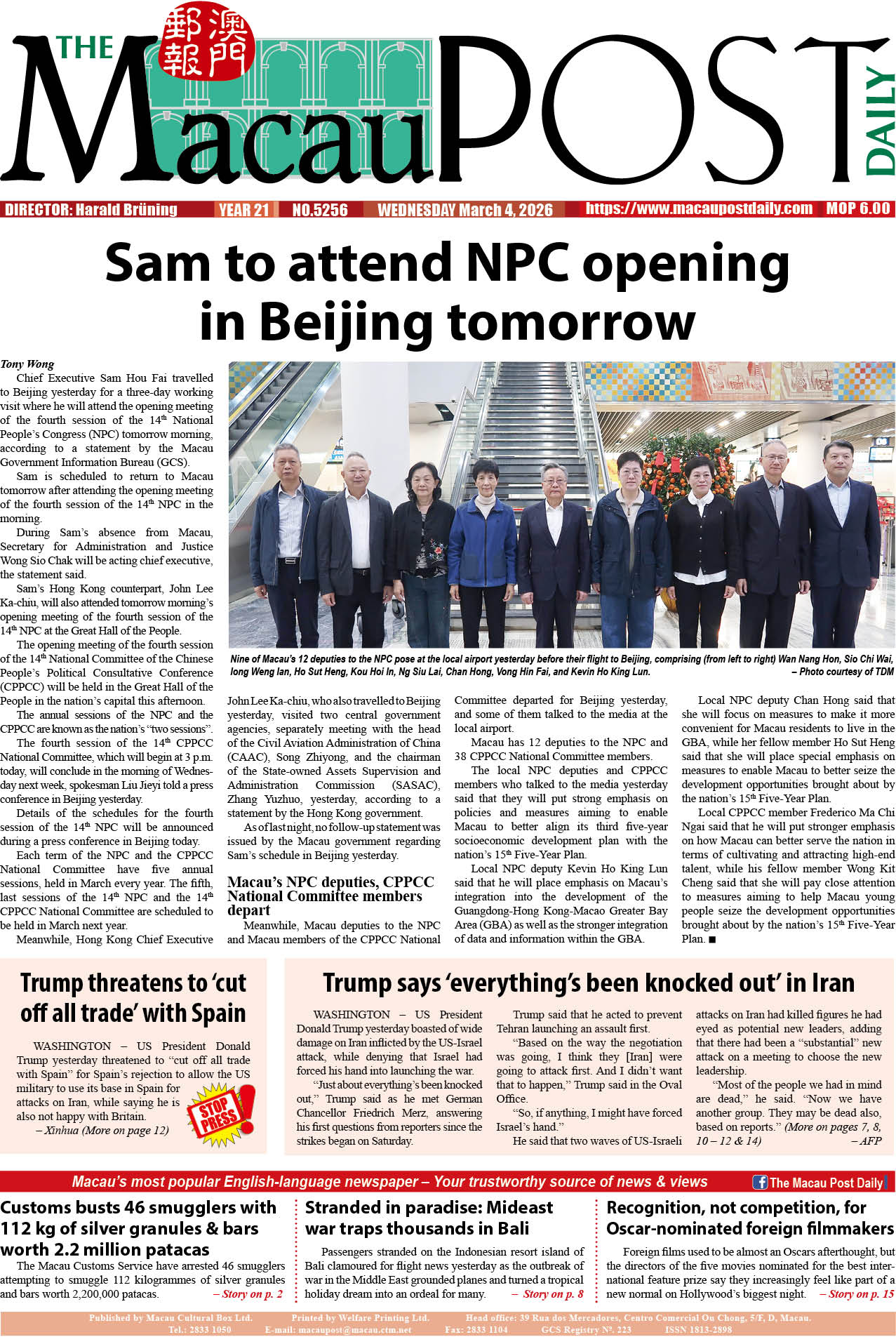Despite the government’s financial support being on the way after the month-and-a-half-long COVID-19 outbreak, the worst Macau has encountered since January 2020 – can the financial support get people out of the woods?
The Macau Debating and Speech Culture Association held an online debate on the topic a fortnight ago, and it shared some opinions via an online interview with The Macau Post Daily yesterday.
This debate, which had eight participants, took place on the day after the city’s “consolidation period” had started. The debate, which lasted for an hour and a half, was themed: “Can the government’s financial support get people out of the woods?”. Former directly-elected lawmaker-cum-Associate Professor of Communication at the public University of Macau (UM) Agnes Lam Iok Fong was one of the adjudicators of the debate.
The association is a non-profit organisation established in 2011 to introduce and nurture speech and debate talents with the idea of spreading the culture of speech and debate.
After the COVID-19 outbreak, which has meanwhile subsided, began on June 18, the government imposed “relatively static” restrictions of people’s movements and a suspension of non-essential operations, which lasted from July 11 to July 23, followed by the “consolidation period” that lasted 10 days and allowed the gradual resumption of business operations and people’s movements.
Both the “relatively static” restrictions and consolidation period had a significant economic impact on the community. The consolidation period was replaced by the “stabilisation period” on Tuesday. It is slated to end this coming Sunday.
Macau Debating and Speech Culture Association President Kuong Weng Hong told The Macau Post Daily he has observed that while the financial support will help solve residents’ urgent needs, they are still facing various problems such as psychological issues, family problems, illnesses, children’s education, problems that cannot be solved by the government’s financial support measures.
The pros & cons
The government’s financial support plan for workers, the self-employed and businesses will start to be disbursed on August 17, after the government announced the launch of a new round of financial support in mid-June, with the second 2022 budget amendment allowing the government to allocate 35.1 billion patacas from the Macau Special Administrative Region’s (MSAR) special reserves to provide tax breaks and exemptions to minimise the impact of the pandemic’s outbreak on people’s lives and the economy.
According to the debate’s pros, the impact of the pandemic – a dramatic decrease in the number of tourists – and the downturn in the global economy have caused a severe blow to enterprises’ revenues and residents’ livelihoods, as Macau’s economy has been dependent on its gaming industry for a long time. The financial support measures will help prevent the tide of business failures to further expand, so that residents’ livelihoods can be assured, according to the pro arguments.
They also underlined that the measures could ease people’s stress – their fear of losing their jobs or having their incomes reduced, and their loss of confidence in Macau’s future development – thus giving them a sense of control and confidence vis-à-vis their futures.
According to the cons, some of the problems cannot be solved by merely economic means, such as the disruption of children’s education due to the suspension of in-class teaching, and the elderly and the disabled being marginalised due to a lack of knowledge of the use of new technologies, such as smart phones for showing one’s health code and the online system for booking a nucleic acid test (NAT).
In addition, the cons pointed out, the growing dependence of businesses and residents on financial assistance from the government will inevitably lead to people demanding even more from the government which would “put the government in a dilemma”.
Moreover, the cons also underlined that the financial support measures will only have a “soothing effect”, as the pandemic is not over yet and businesses have no way to operate normally, which will reduce consumers’ purchasing power and make it difficult for the government to introduce market support measures to create the right conditions for businesses to reopen.
Debate without borders
Kuong said the debate was held online for the first time, which allowed adjudicators and participants from different places. The debate was held in the form of a competition. However, Kuong admitted that there were still some limitations to the online format as there were some barriers to the debaters’ body language and gestures, as well as that they cannot make direct eye contact due to the separation of the screen.
Also, debaters have to adapt to the challenge of not being able to immediately have face-to-face discussions with the other participants, which requires them to be better prepared and come up with faster responses to the debate’s question-and-answer sessions.
Therefore, Kuong said that he will be working with his team to optimise the equipment to improve the stability of the network so that the debate can run more smoothly and with more accurate timing.
Kuong noted that the team is preparing for their next online debate, which will invite participants from the Greater Bay Area (GBA).
That debate is slated for August 27, and Kuong said he hoped to have a “borderless debate”. “We welcome everyone to watch our contest online together, and we want to create a debate without borders”, Kuong said.
Debating, not quarrelling
Meanwhile, Macau Debating and Speech Culture Association Vice-Chairman Pui Sin Tat, one of the co-founders of the association, said that through debate the participants could think from a wider perspective and improve their ability to think critically, analyse issues and respond to different situations, which he believed would be something that would last a lifetime.
Pui said that the first stereotype of debating may be that it is quarrelsome. “We want participants to understand the essence of debate and experience the fun of it,” he said, adding that he also believes that the debates will resonate with the public and give people an insight into social events.

This video grab from Macau Debating and Speech Culture Association’s Facebook shows their recent online debate









